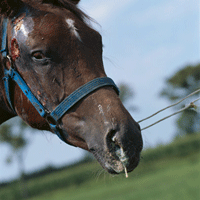Poitou Charente strangles alert
Posted by on Aug 8, 2009 in General News, Welfare | 2 commentsIt has been brought to our attention that there is an outbreak of equine strangles in the Poitou Charente region of SW France. Strangles is a highly infectious disease caused by the bacterium Streptococcus equi and is potentially fatal.

Photo Courtesy of Intervet
The outbreak, called la gourme in French, is thought to have originated from a yard near Poitiers. If you suspect your horse is looking unwell then you may want to study the symptoms of strangles below, and if necessary call your vet out.
Useful information
http://www.equine-strangles.co.uk/
http://www.horsevet.co.uk/strangles.php
http://www.rvc.ac.uk/Supervets/documents/equine/strangles.pdf


Strangles is a highly contagious acute disease of young horses, characterised by abscess formation, especially in the submaxillary glands ( under the jaw ), and inflammation of the upper respiratory tract with nasal discharge.
First symptoms are loss of appetite followed by slight cough. Within a few days, bilateral nasal discahge develops which becomes copious. Lympth nodes of head and neck mayb become inflamed and swollen, those under the jaw being frst affected. If sinusitis or or inflammation of futtural pouches develops, surgical attention may be becessary. Laryngitis may develop and lead to larynegeal hemiplegia ( broken wind ), if horse is being exercised.
Strangles can spread to other parts of the body and localise in areas such as lungs. If it does, it is referred to as ” bastard strangles “.
Organism causing strangles is bacterium Streptococcus equi, which can be found in pus discharge from nose or from abscesses under jaw. The bacteria in the pus are fairly resistant to the environment- their presence in paddocks, feed or water troughs is a source of infection- gain entry into body by ingestion or inhalation. Outbreaks of strangles occur most commonly when large numbers of horses are kept together- many outbreaks thought to be initiated by a carrier, i.e. an infected horse which appears normal.
Call your vet, who will treat horse with antibiotics & surgically attend to any abscesses if drainage required.
While waiting for vet to arrive- isolate horse, provide good nursing.
Vaccination is used extensively in treatmrny of strangles.
Thank you for the info Natalie.
We would like to add that whilst Younger horses (1-5 years old), sick horses, horses with compromised immune systems, and horses in groups are more at risk…it can affect horses and ponies of any age, including donkeys.